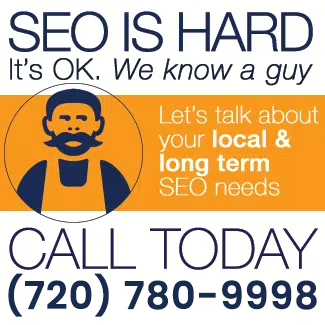The Reality of Running a Business Without a Website
You’ve probably heard it before – “every business needs a website.” But let’s talk about what that actually means for your day-to-day operations and bottom line.
Want to learn more about what makes an effective small business website? Give the team at The Affordable Web Guy a call today for a free, no-pressure consultation chat. Seriously…no hard sell.
Right now, when someone hears about your business from a friend or sees your truck driving by, their first instinct is to look you up online. According to BrightLocal’s 2023 Consumer Review Survey, 98% of consumers used the internet to find information about local businesses. If you’re not there, that potential customer moves on to someone who is.
What a Website Actually Does for Your Business
You Get Found When People Are Looking
Think about your own behavior when you need something. You probably pull out your phone and search “plumber near me” or “best pizza in [your town].” Your customers do the exact same thing.
A website puts you in those search results. Without one, you’re invisible to anyone who doesn’t already know you exist. And here’s the thing – Google My Business listings help, but they’re not enough on their own. A website gives you control over your message and lets you rank for more specific searches.
Trust Happens Before They Even Call
When someone finds your business online, they make a judgment in seconds. A professional website tells them you’re established, legitimate, and worth calling. No website? They might wonder if you’re still in business or if you’re professional enough to handle their needs.
This isn’t about being fancy – it’s about meeting basic expectations. Your website doesn’t need to win design awards. It just needs to look clean, load fast, and clearly explain what you do.
Local SEO: The Game-Changer for Small Businesses
Why “Near Me” Searches Matter More Than Ever
Local searches have exploded in recent years. According to Google’s research, “near me” searches have increased by over 500% in the past few years. These aren’t random browsers – they’re people ready to buy. In fact, 76% of people who search for something nearby on their smartphone visit a related business within a day.
Your website needs to be optimized for these local searches. That means:
Location-specific pages – If you serve multiple areas, create pages for each. “Plumbing Services in Wheat Ridge” performs better than generic “Plumbing Services” when someone in Wheat Ridge is searching.
Local keywords naturally integrated – Mentioning neighborhoods, landmarks, and surrounding areas throughout your content helps Google understand exactly where you serve.
Schema markup – This behind-the-scenes code tells search engines exactly what your business does and where. It’s like giving Google a roadmap to understand your business better.
The Local Pack Advantage
You know those three businesses that show up with a map when you search for local services? That’s the Local Pack, and it drives massive traffic. Websites optimized for local SEO are far more likely to appear there.
Getting into the Local Pack isn’t just about having a Google My Business profile. Your website’s local optimization plays a huge role. Google looks at:
- How well your website content matches local searches
- Whether your NAP (Name, Address, Phone) is consistent everywhere
- How many local websites link to yours
- The quality and relevance of your content for local searchers
Building Local Authority
Local SEO isn’t just about technical stuff – it’s about becoming the go-to resource for your community. A locksmith who writes about “Common Lock Problems in Historic Denver Homes” or a landscaper covering “Best Plants for Colorado’s Climate” builds authority that generic content never could.
This local-focused approach is exactly what The Affordable Web Guy’s small business website services prioritize – creating sites that dominate local search results by actually being useful to local customers.
The Practical Benefits You’ll Actually Notice
Your Business Works While You Sleep
Every business owner knows the frustration of missing calls during busy times or after hours. A website captures those leads automatically. Someone searching at 11 PM can fill out a contact form, browse your services, and decide to hire you – all while you’re asleep.
Real example: A local HVAC company started getting 3-4 quote requests per week through their website form, mostly submitted outside business hours. Those were leads they would have completely missed before.
You Stop Answering the Same Questions
How much does it cost? What are your hours? Do you service my area?
Sound familiar? A well-organized website answers these questions automatically. You’ll still get calls, but they’ll be from people ready to buy, not just gathering basic information. This alone can save you hours each week.
What Makes a Website Actually Work for Local Businesses
Not all websites are created equal. Here’s what separates a website that just exists from one that actually brings in local business:
Neighborhood and Area Pages
Create specific pages for each area you serve. A roofing company might have pages for “Roof Repair in Arvada,” “Westminster Roofing Services,” and “Thornton Emergency Roof Repair.” Each page speaks directly to people searching in those areas.
Local Content That Matters
Blog posts about local events you sponsor, projects you’ve completed in specific neighborhoods, or challenges unique to your area (like how Denver’s hail affects roofs) show both Google and customers that you’re genuinely part of the community.
Reviews and Local Proof
Showcasing reviews from local customers, featuring projects in recognizable locations, and highlighting your involvement in the community all build local credibility that out-of-town competitors can’t match.
Mobile-First Design for Local Searches
Over 60% of searches happen on phones, but for local searches, it’s even higher. Someone with a burst pipe isn’t sitting at a desk – they’re on their phone looking for help now. If your site doesn’t work perfectly on mobile, you’re losing emergency calls to competitors who got it right.
Speed and Security
Slow sites lose visitors. According to research from Google, 53% of mobile users leave a site that takes longer than 3 seconds to load. Plus, Google now uses site speed as a ranking factor, so faster sites show up higher in search results.
The Local Link Network
One often-overlooked aspect of local SEO is building connections with other local businesses and organizations online. When the local Chamber of Commerce links to your website, or when you’re listed as a sponsor on a local charity’s site, these local links tell Google you’re a legitimate part of the community.
This isn’t about trading links with every business in town. It’s about genuine relationships that happen to have an online component. Sponsor a local team? Make sure they link to you. Member of a trade organization? Get listed in their directory. Partner with other businesses? Feature each other on your websites.
Voice Search and Local Intent
“Hey Siri, find me a plumber near me.”
Voice searches are inherently local and conversational. People don’t voice search “plumbing services” – they say “who can fix my toilet today?” or “emergency plumber open now.”
Your website needs to answer these natural language queries. FAQ pages work great for this. Questions like “Do you offer emergency service?” or “How quickly can you come out?” match how people actually talk to their devices.
Building It Right the First Time
If you’re going to invest in a website, do it properly. A DIY website builder might seem cheaper initially, but you’ll likely end up paying more to fix it later when it doesn’t bring in business.
Professional WordPress sites offer the flexibility to grow with your busines. Need to add online booking later? Want to start selling products? A properly built WordPress site can handle it without starting from scratch.
The Affordable Web Guy’s approach focuses on what small businesses actually need: clean design that matches your brand, content written for both people and search engines, reliable hosting with security included, and ongoing support so you’re never stuck.
Measuring Local Success
How do you know if your website is actually working for local SEO? Look for:
Local traffic growth – Are more people from your service area finding your site?
“Near me” rankings – Do you show up when someone nearby searches for your services?
Phone calls from the website – Track calls from people who found you online versus other sources.
Form submissions with local intent – Are people mentioning specific neighborhoods or asking about service to their area?
Foot traffic – For brick-and-mortar businesses, are more people mentioning they found you online?
These metrics matter more than generic website traffic. A thousand visitors from across the country mean nothing to a local plumber. Ten visitors from your neighborhood who need service today? That’s what pays the bills.
The Investment That Pays for Itself
Let’s talk numbers. A basic professional website typically runs between $2,500-5,000. That might seem like a lot, but consider this: If your website brings in just one new customer per month, how long before it pays for itself?
For most businesses, the answer is surprisingly quick. A landscaper charging $500 for a typical job breaks even in 5-10 months. A dentist might break even with just 2-3 new patients. And remember, these websites last for years.
Plus, local SEO compounds over time. The longer your optimized site is online, the more authority it builds, and the easier it becomes to rank for competitive local terms.
Questions Business Owners Often Ask About Local Websites
How long does it take to see local SEO results?
Most businesses start seeing some local traffic within a few weeks, but real results typically show up around the 3-6 month mark as search engines recognize and trust your local authority.
Can’t I just use social media instead?
Social media is great for engagement, but you don’t own it. Algorithms change, accounts get suspended, and platforms disappear. Your website is the only online presence you fully control. Plus, social media doesn’t show up in “near me” searches.
What if I only serve a small area?
That’s actually an advantage. It’s easier to dominate search results for “electrician in Wheat Ridge” than “electrician in Denver.” Smaller service areas mean less competition and more targeted traffic.
Do I need different websites for different locations?
Usually no. One website with location-specific pages typically works better than multiple sites. Google prefers authoritative sites with comprehensive local content over thin sites trying to game the system.
Making the Decision
Running a small business without a website in 2024 is like having a store with no sign. Sure, some people might stumble in, but you’re making it unnecessarily hard for customers to find and choose you.
Local search isn’t going away. If anything, it’s becoming more important as people expect to find everything they need with a quick “near me” search. The question isn’t really whether you need a website anymore. It’s whether you want to keep losing potential customers to competitors who are easier to find online.
If you’re ready to stop leaving money on the table, schedule a free consultation to discuss what your business actually needs. No high-pressure sales tactics – just an honest conversation about how to dominate your local market online.

